For most Canadians, the world is in trouble.
November 1, 2018
Canadians may be somewhat divided as to whether the country is heading in the right direction (40%) or off on the wrong track (37%), but compared to what we see in the rest of the world, the consensus seems to be things could be worse. Around the world, only 16% see things going in the right direction, while 61% say things are off on the wrong track.
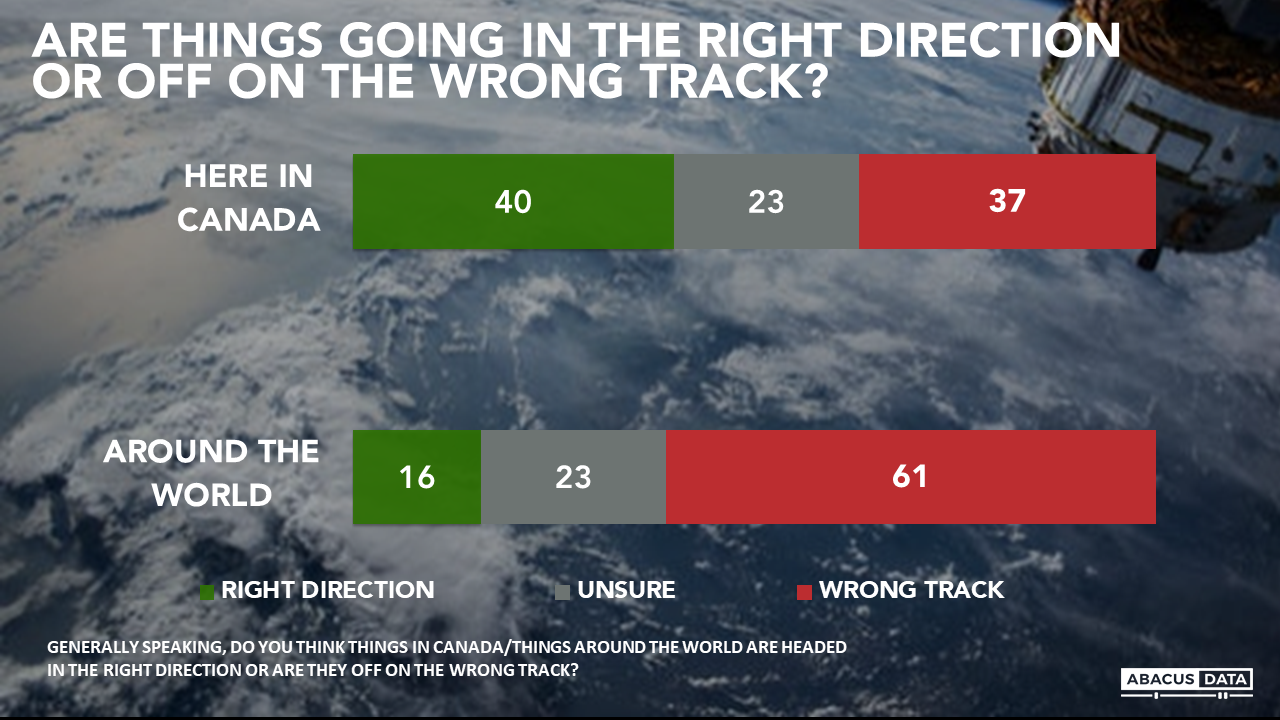
There are regional, political and slight generational differences in feelings about the direction of things in Canada. Younger people are more likely to feel positive, and “right track” is the plurality response in BC, Ontario, Quebec and Atlantic Canada. Prairie residents and Conservative voters occupy the other end of the spectrum on this question.
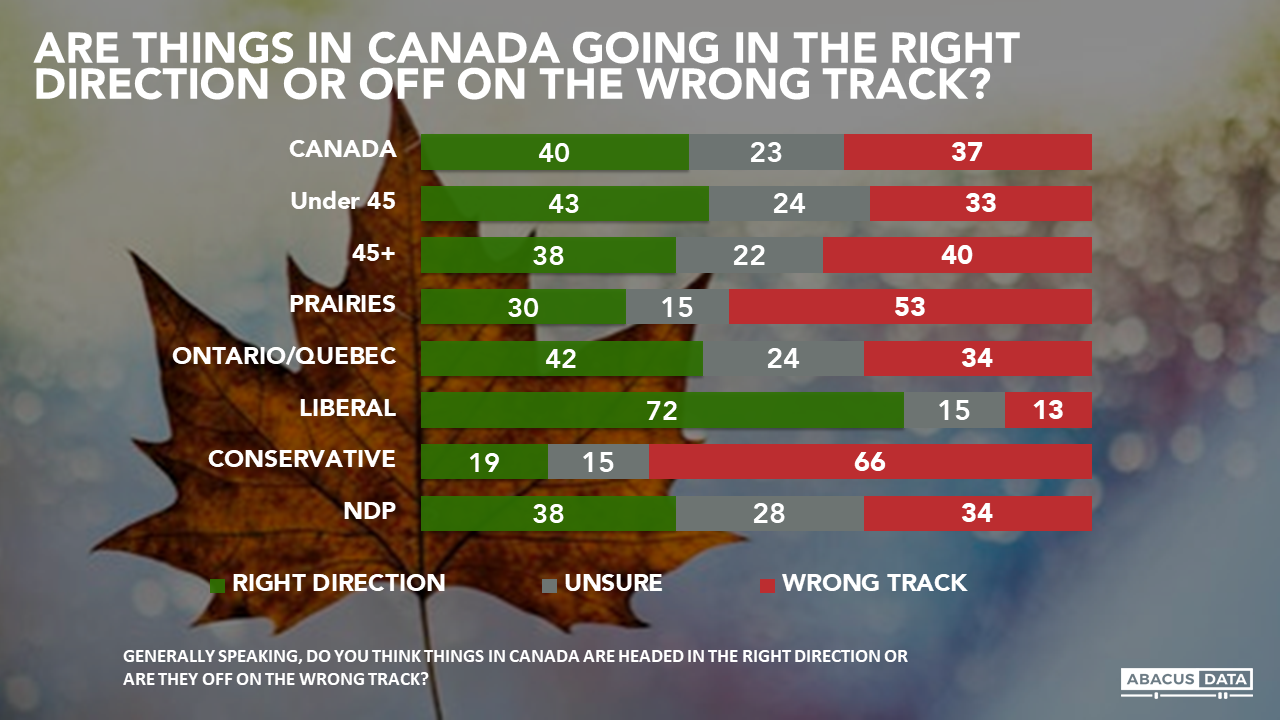
But when evaluating the state of the world, differences in view among Canadians are modest – people in all age groups, regions, and every party believe the world is doing badly
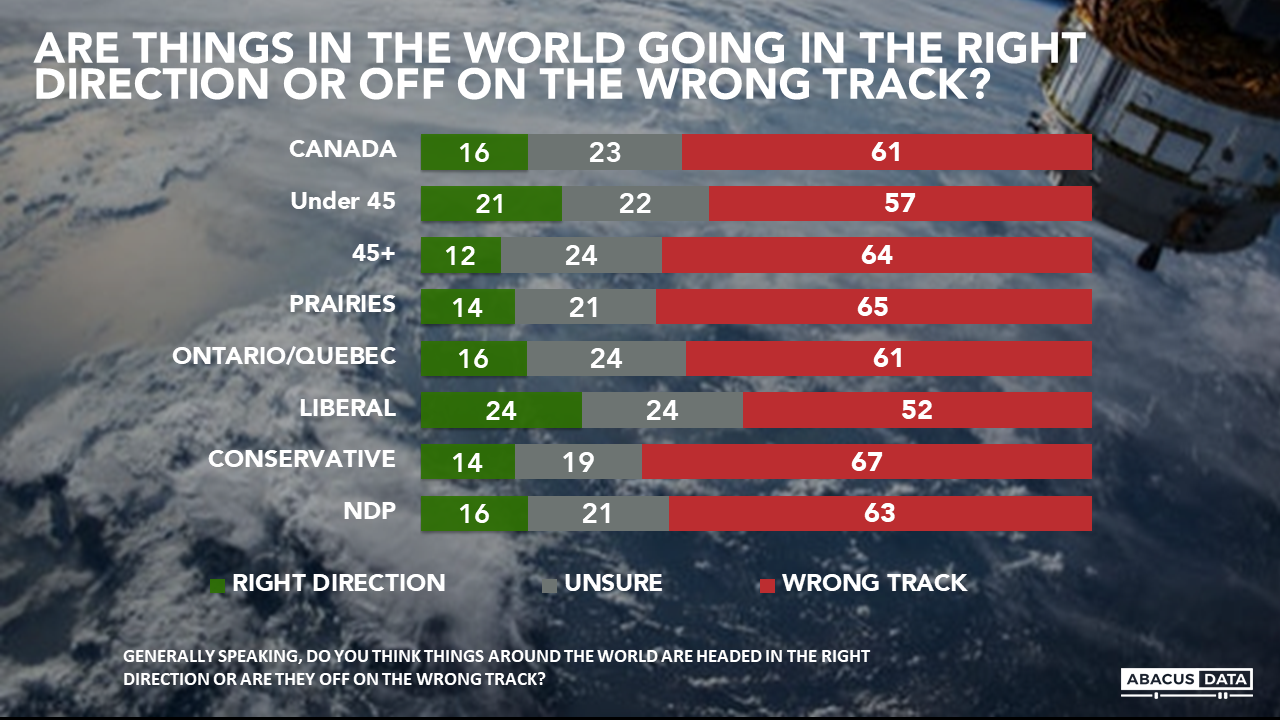
THE BIG PROBLEMS FACING CANADA
To dig into the issues that matter to people today, we used a question structure that the Pew Research team has used, allowing us to compare results in the US to those in Canada. We asked people to rate the seriousness of a series of issues in Canada. Here are some of the interesting findings of the leading concerns of Canadians.
-The adage holds that elections are always about the economy. But while the top economic concern is usually jobs, today, things are different. People are more concerned about wages, the cost of living, the cost of housing, and the gap between the rich and the poor.
-The opioid crisis has also become a large, mainstream concern. Drug addiction has probably never figured as prominently among the concerns of Canadians than it does today.
-Climate change ranks relatively high on the list of concerns, just slightly ahead of illegal immigration and the federal deficit.
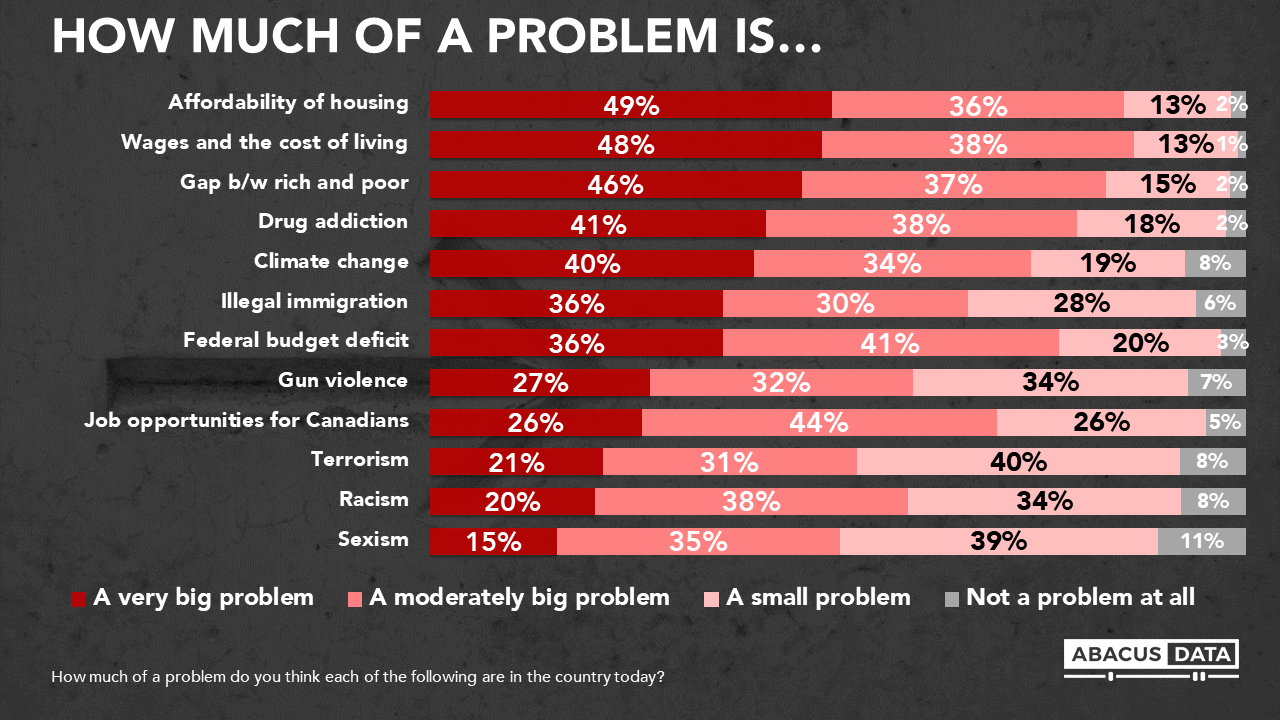
For the most part, the hierarchy of top problems is similar for younger as for older Canadians, but older people put more emphasis on drug addiction, the budget deficit, and illegal immigration while younger Canadians are more likely to feel that job opportunities and racism are problems.
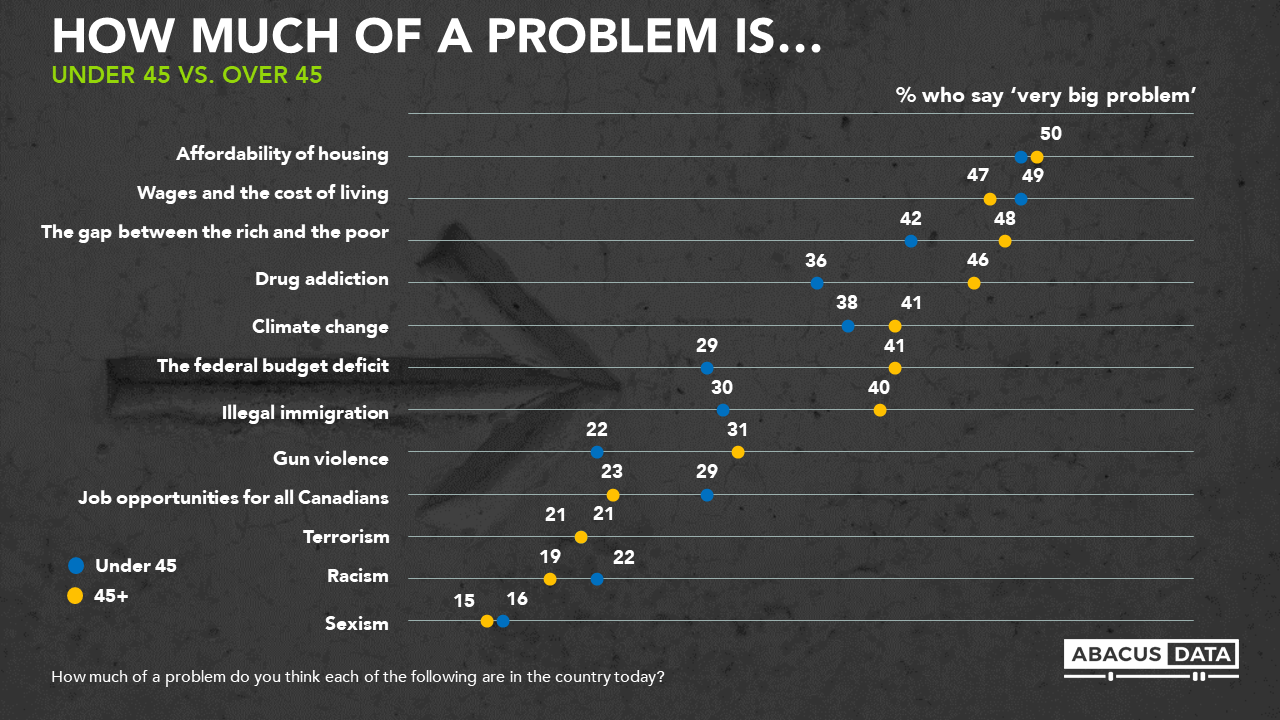
Women rated all the issues more seriously than men. The gap is largest on housing affordability, wages, and cost of living, drug addiction, climate change, and sexism.
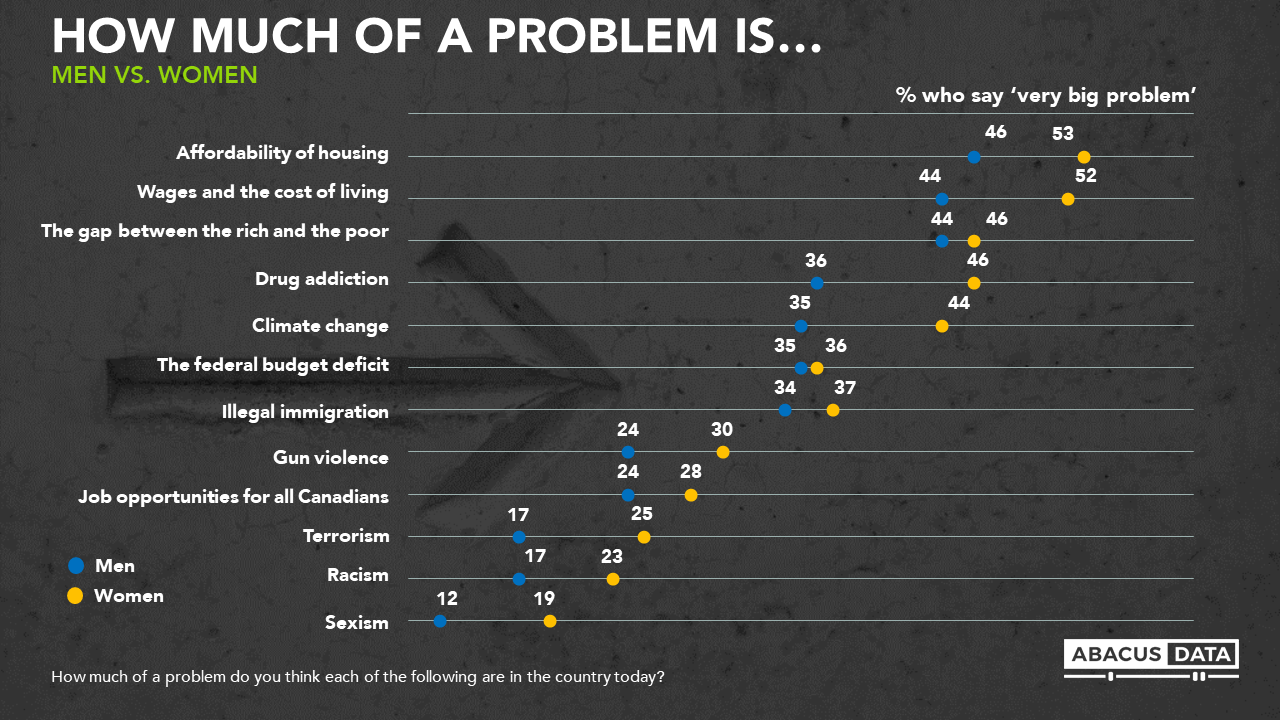
Because the differences in partisan leanings are markedly different between those living on the Prairies and those in Ontario and Quebec, we took a look at the differences in issues of importance. On the Prairies, housing costs are roughly equivalent in the importance of drug addiction, the deficit and illegal immigration. In central Canada, gun violence, the gap between rich and poor, and especially climate change all show significantly higher levels of concern.
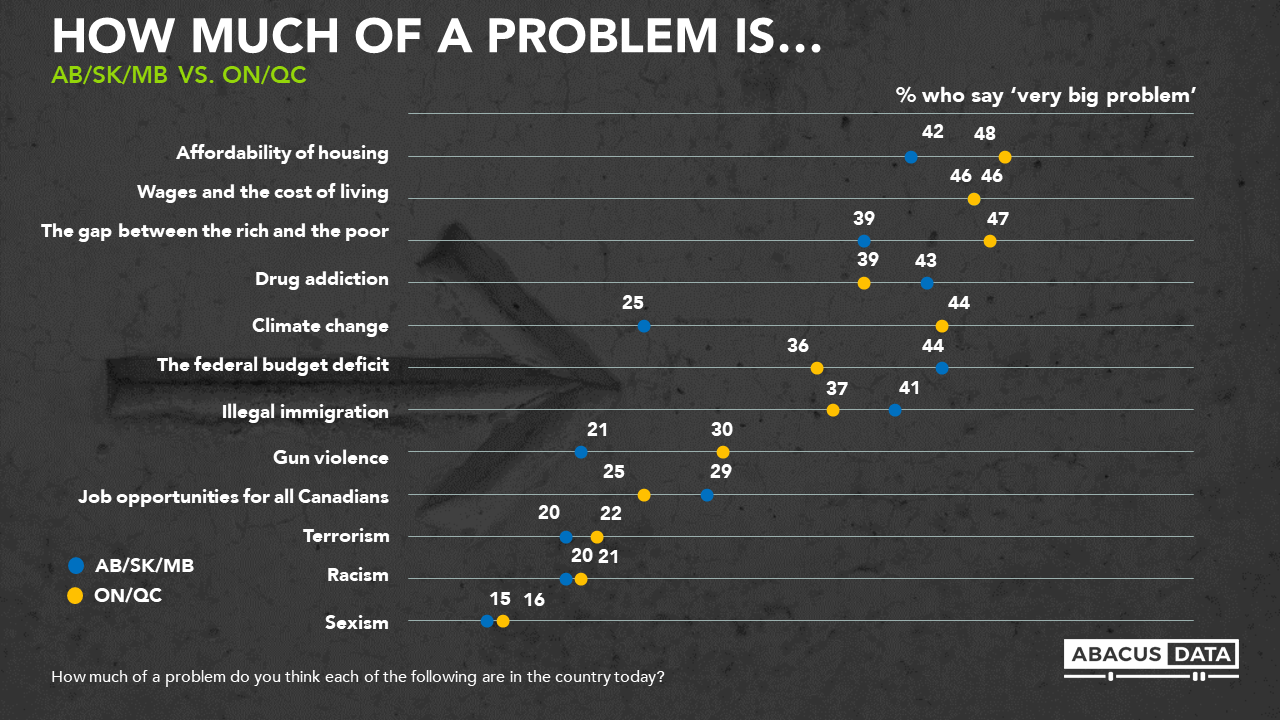
Politically, there are some very sharp differences. Conservatives are far more likely to rate the federal budget deficit, illegal immigration, and terrorism as very big. NDP voters are more likely to emphasize wages and the cost of living and the gap between the rich and the poor. Liberal and NDP supporters are far more preoccupied with climate change compared to Conservatives supporters. Liberals are least likely to see illegal immigration as a very big problem while NDP supporters are more likely to be concerned about housing affordability although that issue is the highest concern for the most people overall.

Roughly 8 million voters are characterized as “Persuadable” or swing voters in our segmentation model (people who say they are inclined to want a change in government but could be persuaded to vote to re-elect the incumbents).
When we compare Blue Persuadables (inclined to vote Conservative) and Orange Persuadables (inclined to vote NDP) there are distinct agenda differences. Orange Persuadables focus on the gap between the rich and poor, climate change, and wages and cost of living, while Blue Persuadables are more preoccupied with the federal budget deficit and illegal immigration.
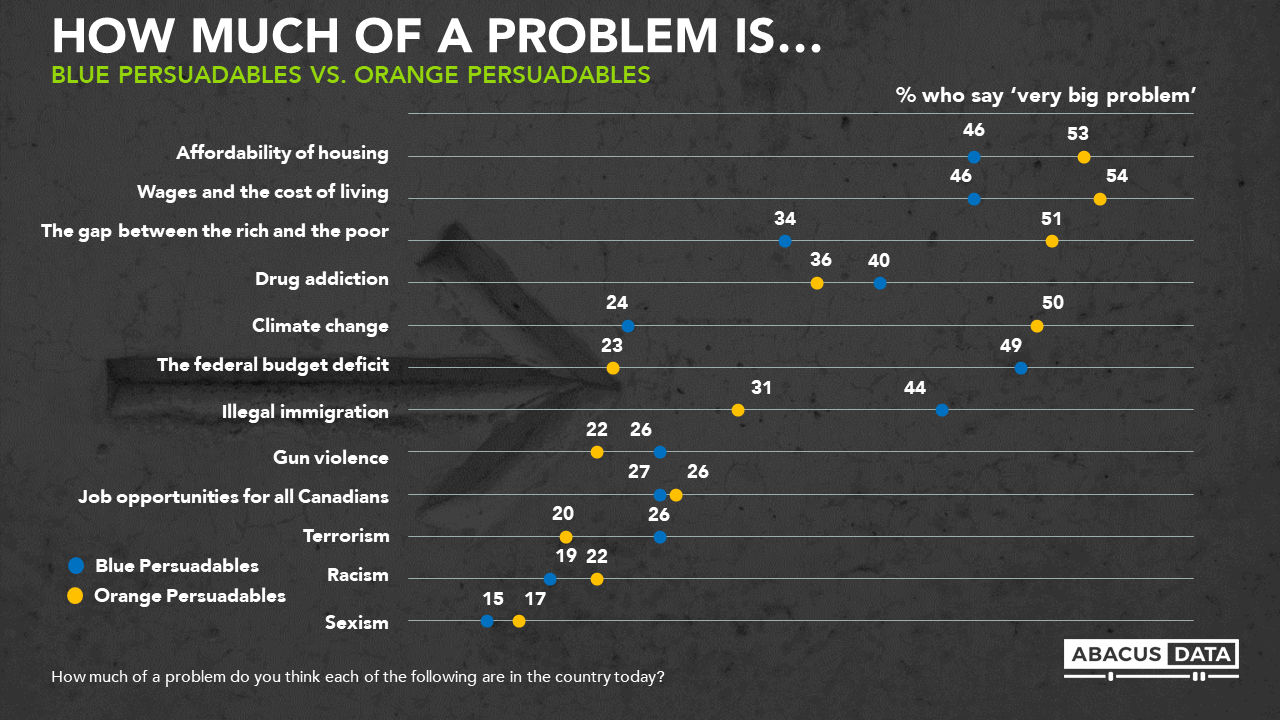
CANADIANS AND AMERICANS
When looking at recent results to these questions among Americans, we see:
-Similar levels of concern about wages and the cost of living, illegal immigration, climate change, and jobs.
-Americans are 19 points more preoccupied with the deficit, 19 points more likely to say sexism is a very big problem, and over 25 points more concerned about drug addiction, gun violence, and racism. Drug addiction is the most intense concern of all of those tested in the US.

UPSHOT
The level of anxiety in America is clearly higher than it is in Canada, and the list of concerns is quite different in some respects. Overall, it seems that economic growth and jobs are not as pressing a concern as wages, the cost of living, and economic inequality. This appears true in both countries.
America is grappling with drug addiction and gun violence and feels considerably more stress around gender and race equality. Americans are also showing some reaction to the growth in the federal deficit under President Trump.
Here in Canada, the principal focus for many people is the cost of living. Beyond that, we see some important differences by region and political affiliation. Climate change is a preoccupation for centre and left voters but conservatives and Prairie voters do not attach nearly as much importance to the issue. Similar cleavages are evident on illegal immigration and gun violence.
Canadians are far from universally happy or complacent, but there is clearly a sense that our problems are not as big as those in other parts of the world, and the data show that while we have political cleavages, they are isolated to a handful of issues, around climate change, law and order and to some degree cultural diversity/immigration. The next election promises to be an important test of what agenda is chosen by the most voters, and what solutions they favour to the issues they care about.
METHODOLOGY
Our survey was conducted online with 1,650 Canadians aged 18 and over from October 24 to 29, 2018. A random sample of panelists was invited to complete the survey from a set of partner panels based on the Lucid exchange platform. These partners are double opt-in survey panels, blended to manage out potential skews in the data from a single source.
The margin of error for a comparable probability-based random sample of the same size is +/- 2.2%, 19 times out of 20. The data were weighted according to census data to ensure that the sample matched Canada’s population according to age, gender, educational attainment, and region. Totals may not add up to 100 due to rounding.
ABOUT ABACUS DATA
We are the only research and strategy firm that helps organizations respond to the unprecedented threat of generational change and technological disruption.
We are an innovative, fast-growing public opinion and marketing research consultancy. We use the latest technology, sound science, and deep experience to generate top-flight research-based advice to our clients. We offer global research capacity with a strong focus on customer service, attention to detail and exceptional value.
Contact us with any questions.




